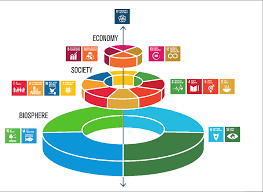The Sustainable Development Goals and the United Nations
The Sustainable Development Goals (SDGs) are a set of 17 global goals established by the United Nations in 2015. These goals are designed to address a range of social, economic, and environmental challenges facing the world today.
The SDGs cover a wide range of issues, including poverty, hunger, health, education, gender equality, clean water, sustainable energy, climate action, and more. Each goal has specific targets to be achieved by 2030 in order to create a more sustainable and equitable world for all.
The United Nations plays a crucial role in promoting and monitoring the progress towards achieving the SDGs. Through its various agencies, programmes, and initiatives, the UN works with governments, businesses, civil society organisations, and individuals to drive action on the goals at both national and global levels.
While significant progress has been made since the adoption of the SDGs, there is still much work to be done. Challenges such as poverty, inequality, climate change, and conflict continue to threaten the well-being of people around the world.
It is essential for all stakeholders to come together and take collective action to ensure that the SDGs are met by 2030. By working towards these common goals, we can build a more sustainable future for generations to come.
Deciphering the Significance of the 17 Sustainable Development Goals
Exploring the Relationship Between the SDGs and the United Nations
4. The United
- What is UN 2030 Sustainable Development Goals agenda?
- What do the 17 SDGs mean?
- Is SDG part of UN?
- What is the SDG goal of UN?
What is UN 2030 Sustainable Development Goals agenda?
The UN 2030 Sustainable Development Goals agenda is a comprehensive framework established by the United Nations to address global challenges and promote sustainable development. Consisting of 17 interconnected goals, the agenda aims to tackle issues such as poverty, inequality, climate change, and environmental degradation by setting specific targets to be achieved by the year 2030. Through collaboration with governments, businesses, civil society, and individuals worldwide, the SDGs seek to create a more equitable, prosperous, and environmentally sustainable future for all. By focusing on areas such as education, healthcare, clean energy, and gender equality, the agenda strives to build a better world for current and future generations.
What do the 17 SDGs mean?
The 17 Sustainable Development Goals (SDGs) set by the United Nations encompass a comprehensive framework aimed at addressing various global challenges. Each SDG represents a specific target that collectively strives to tackle issues such as poverty, inequality, climate change, education, health, and more by the year 2030. These goals serve as a roadmap for countries and organisations to work towards a sustainable and equitable future for all, promoting economic development, social inclusion, and environmental protection on a global scale.
Is SDG part of UN?
The Sustainable Development Goals (SDGs) are indeed an integral part of the United Nations (UN). Adopted by UN member states in 2015, the SDGs represent a universal call to action to end poverty, protect the planet, and ensure prosperity for all. The UN plays a central role in promoting and monitoring progress towards achieving the SDGs, working closely with governments, businesses, and civil society to drive sustainable development efforts worldwide. The SDGs provide a framework for collective action towards a more equitable and sustainable future, highlighting the UN’s commitment to addressing global challenges through cooperation and collaboration.
What is the SDG goal of UN?
The Sustainable Development Goals (SDGs) are a set of 17 global goals established by the United Nations to address various social, economic, and environmental challenges worldwide. Each goal has specific targets aimed at achieving a more sustainable and equitable world by 2030. The overarching goal of the UN’s SDGs is to tackle issues such as poverty, hunger, health, education, gender equality, clean water, sustainable energy, climate action, and more in order to improve the well-being of people and the planet.

No Responses